Reading makes all other learning possible. Check back often for a selection of interesting and relevant books and publications, curated by the IEEE Life Members Committee (ILMC).
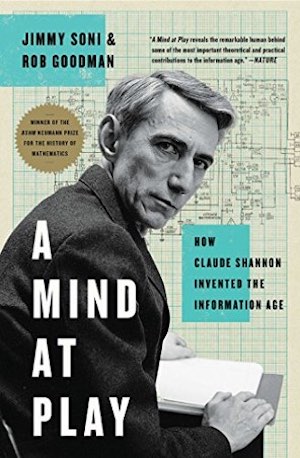
A Mind at Play
Jimmy Soni and Rob Goodman
In their second collaboration, biographers Jimmy Soni and Rob Goodman present the story of Claude Shannon—one of the foremost intellectuals of the twentieth century and the architect of the Information Age, whose insights stand behind every computer built, email sent, video streamed, and webpage loaded. Claude Shannon was a groundbreaking polymath, a brilliant tinkerer, and a digital pioneer. He constructed the first wearable computer, outfoxed Vegas casinos, and built juggling robots. He also wrote the seminal text of the digital revolution, which has been called “the Magna Carta of the Information Age.” In this elegantly written, exhaustively researched biography, Soni and Goodman reveal Claude Shannon’s full story for the first time. With unique access to Shannon’s family and friends, A Mind at Play brings this singular innovator and always playful genius to life.
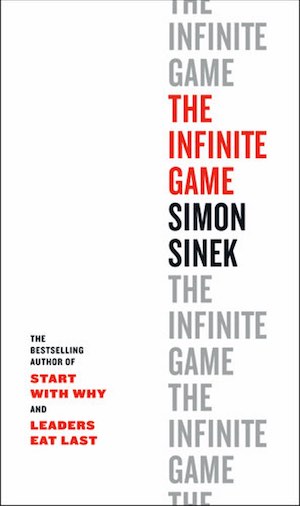
Infinite Game
Simon Sinek
Business is an infinite game, per motivational speaker Simon Sinek. The players may change, but the game continues. Sinek, the golden boy of organizational consultancy, offers a slick, polished presentation as he shares the five characteristics of infinite-game leadership, but his analysis, though ripe with real-life examples, lacks any scientific backing or data. Nevertheless, Sinek’s passionate, expert-sounding delivery will maintain his status as an audience favorite.
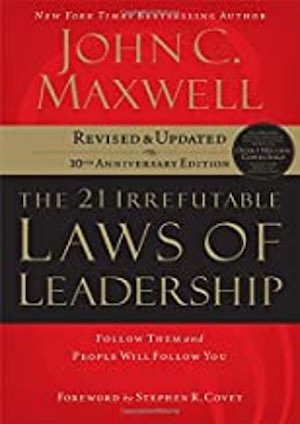
The 21 Irrefutable Laws of Leadership
John Maxwell
Internationally-recognized leadership expert and bestselling author John C. Maxwell wrote his million-seller The 21 Laws of Leadership over ten years ago. Now, this expanded and updated edition of one of the most trusted and referenced leadership books features revised content that is fundamental to any leader. Featuring insights learned from Maxwell’s 30-plus years of leadership successes and mistakes with observations from the worlds of business, politics, sports, religion, and military conflict. The result is a revealing study of leadership delivered as only a communicator like Maxwell can. Follow these laws of leadership and people will follow you.
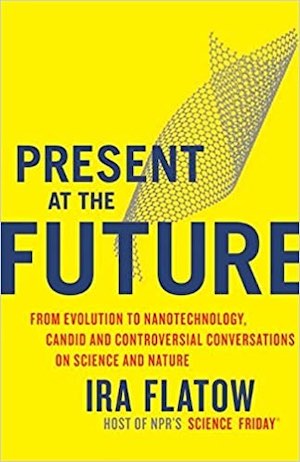
Present at the Future
Ira Flatow
Veteran NPR® science correspondent and award-winning radio and TV journalist Ira Flatow’s enthusiasm for all things science has made him a beloved on-air journalist. For more than thirty-five years, Flatow has interviewed the top scientists and researchers on many NPR and PBS programs, including his popular Science Friday® spot on Talk of the Nation. In Present at the Future, he shares the groundbreaking revelations from those conversations, including the latest on nanotechnology, space travel, global warming, alternative energies, stem cell research, and using the universe as a super–super computer. Flatow also further explores his favorite topic of the science of everyday life with explanations on why the shower curtain sticks to you, the real story of why airplanes fly, and much more.
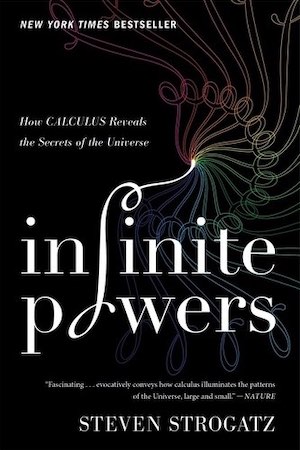
Infinite Powers – How Calculus Reveals the Secrets of the Universe
Steve Strogatz
Without calculus, we wouldn’t have cell phones, TV, GPS, or ultrasound. We wouldn’t have unraveled DNA or discovered Neptune or figured out how to put 5,000 songs in your pocket. Though many of us were scared away from this essential, engrossing subject in high school and college, Steven Strogatz’s brilliantly creative, down to earth history shows that calculus is not about complexity; it’s about simplicity. It harnesses an unreal number—infinity—to tackle real world problems, breaking them down into easier ones and then reassembling the answers into solutions that feel miraculous. Infinite Powers recounts how calculus tantalized and thrilled its inventors, starting with its first glimmers in ancient Greece and bringing us right up to the discovery of gravitational waves (a phenomenon predicted by calculus). Strogatz reveals how this form of math rose to the challenges of each age: how to determine the area of a circle with only sand and a stick; how to explain why Mars goes “backwards” sometimes; how to make electricity with magnets; how to ensure your rocket doesn’t miss the moon; how to turn the tide in the fight against AIDS. As Strogatz proves, calculus is truly the language of the universe. By unveiling the principles of that language, Infinite Powers makes us marvel at the world anew.
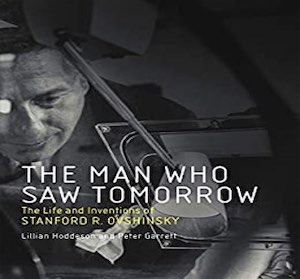
The Man Who Saw Tomorrow: The Life and Inventions of Stanford R. Ovshinsky
Lillian Hoddeson and Peter K. Garrett
In The Man Who Saw Tomorrow, Lillian Hoddeson and Peter Garrett tell the story of an unconventional genius with no formal education beyond high school who invented, among other things, the rechargeable nickel metal hydride batteries that have powered everything from portable electronics to hybrid cars, a system for mass-producing affordable thin-film solar panels, and rewritable CDs and DVDs. His most important discovery, the Ovshinsky effect, led to a paradigm shift in condensed matter physics and yielded phase-change memory, which is now enabling new advances in microelectronics. A son of the working class who began as a machinist and toolmaker, Ovshinsky focused his work on finding solutions to urgent social problems, and to pursue those goals, he founded Energy Conversion Devices, a unique research and development lab. At the end of his life, battered by personal and professional losses, Ovshinsky nevertheless kept working to combat global warming by making solar energy “cheaper than coal”—another of his many visions of a better tomorrow.
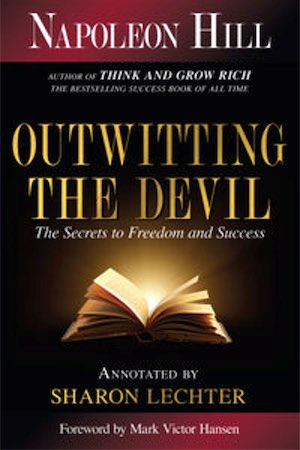
Outwitting the Devil
Napoleon Hill, Annotated by Sharon Lechter
In 1938, just after publication of his all-time bestseller Think and Grow Rich, Napoleon Hill reveals that he broke the Devil’s Code, forcing him to confess how he exerts his influence on people who are left drifting through life, achieving less than their full potential. The resulting manuscript—Outwitting the Devil—proved so controversial, it was hidden for more than seventy years. Now Sharon Lechter brings us this important book, annotating and editing it for a contemporary audience. Using his legendary ability to get to the root of human potential, Hill digs deep to identify the greatest obstacles we face in reaching our personal goals—including fear, procrastination, anger, and jealousy—as tools orchestrated by the Devil himself. These hidden methods of control can lead us to ruin, and Hill reveals the seven principles of good that will allow us to finally triumph over them and succeed. Fascinating, provocative, and empowering Outwitting the Devil shows how to create your own path to success, harmony, and fulfillment in an age of uncertainty and fear.
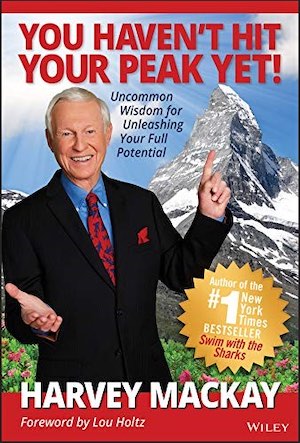
You Haven’t Hit Your Peak Yet!
Harvey MacCay
If you haven’t reached your peak, you’re not alone. But still, you’re doing something right. Sound strange? Well, any businessperson worth their salt knows it takes determination to reach the finish line. The business world is constantly changing so it’s essential to learn, adapt, and grow. In all-new pieces of wisdom, common sense, and advice, Harvey Mackay shares his decades of business leadership acumen to show you how to stay relevant, fluid, and on the path for success. Told with the sort of straight-shooting humor that only Harvey Mackay can deliver,”You Haven’t Hit Your Peak Yet” is your personal road map for the route that can take you to the top.
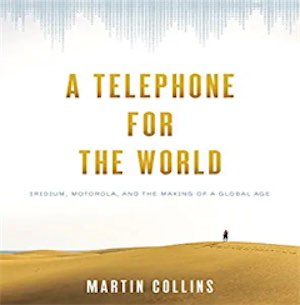
A Telephone for the World
Martin Collins
This book explores the story of globalization at a crucial period in US and international history. As the Cold War waned, corporations and nations reoriented toward a new global order in which markets, neoliberal ideology, and the ideal of a borderless world predominated. As a planetary-scale technological system, the project became emblematic of this shift and of the role of the United States as geopolitical superpower. In its ambition, scope, challenges, and organizing ideas, this project provides telling insight into how this new global condition stimulated a re-thinking of corporate practices—on the factory floor, in culture and knowledge, and in international relations.
Combining oral history interviews with research in corporate records, Martin Collins opens up new angles on what global meant in the years just before and after the end of the Cold War. The first book to tell the story of this project (Iridium) in this context, A Telephone for the World is a fascinating look at how people, nations, and corporations across the world grappled in different ways with the meaning of a new historical era.
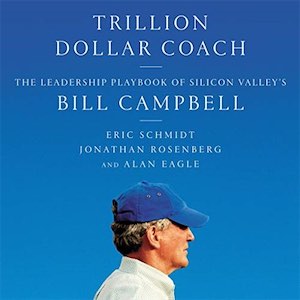
Trillion Dollar Coach: The Leadership Playbook of Silicon Valley’s Bill Campbell
Eric Schmidt, Jonathan Rosenberg, and Alan Eagle
Bill Campbell played an instrumental role in the growth of several prominent companies, such as Google, Apple, and Intuit, fostering deep relationships with Silicon Valley visionaries, including Steve Jobs, Larry Page, and Eric Schmidt. In addition, this business genius mentored dozens of other important leaders on both coasts, from entrepreneurs to venture capitalists to educators to football players, leaving behind a legacy of growing companies, successful people, respect, friendship, and love after his death in 2016.
Leaders at Google for over a decade, Eric Schmidt, Jonathan Rosenberg, and Alan Eagle experienced firsthand how the man fondly known as Coach Bill build trusting relationships, fostered personal growth—even in those at the pinnacle of their careers—inspired courage, and identified and resolved simmering tensions that inevitably arise in fast-moving environments. To honor their mentor and inspire and teach future generations, they have codified his wisdom in this essential guide.
Based on interviews with over eighty people who knew and loved Bill Campbell, Trillion Dollar Coach explains the Coach’s principles and illustrates them with stories from the many great people and companies with which he worked. The result is a blueprint for forward-thinking business leaders and managers that will help them create higher performing and faster moving cultures, teams, and companies.

Europe’s Top 100 Masterpieces: Art for the Traveler
Rick Steves
Travel through time and discover Europe’s most iconic paintings, sculptures, and historic buildings. From Venus to Versailles, Apollo to David, and Mona Lisa to The Thinker, Rick and co-author Gene Openshaw will have you marveling, learning, and laughing, one masterpiece at a time. Whether you’re traveling to Europe or just dreaming about it, this book both stokes your wanderlust and kindles a greater appreciation of art, with historical context and information on where to see it for yourself.
Have you read something good lately? Submit the title, author, and why you think Life members should read it, and it may be featured it on this page. Send an email to [email protected].






